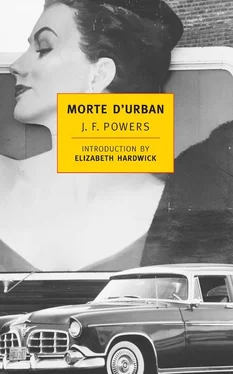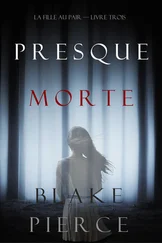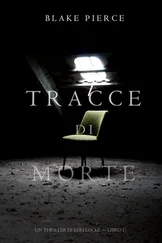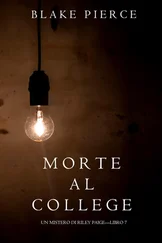Father Urban and Johnny were alarmed, though, by some of their other findings. Both men were out of touch with hearth and home, the one because of his years of itinerancy and more or less public life, the other because of his years in the seminary and his reclusive habits since then, and so they really couldn’t say whether the squalor in which so many parishioners lived, particularly in Orchard Park, was peculiar to them or was now nationwide, peculiar to the times. It wasn’t squalor such as Father Urban had seen in city slums. No, if anything, the Orchard Parkers possessed more than their share of the world’s goods. Whether the women were unable to keep house, or were unwilling, or both, wasn’t clear to Father Urban, but that they didn’t was a fact too often encountered to be ignored — and not to be passed off with a laughing reference to little ones. What embarrassment there was lacked conviction. The shoes and socks and pajamas and dirty glasses and cups that had a way of disappearing from the living room during the course of his visit — they’d all be back again, he knew. Who was to blame? When, in recent years, Father Urban had read that the American male had gone soft, he’d always considered the source — another green-eyed European, another G.I. who’d married an Asiatic — but Orchard Park suggested that there might be some truth in the charge.
It wasn’t rare for women to return to bed after breakfast, if, indeed, they got up for it. They had no more time sense than Mexicans. “Just say the priest was here,” Father Urban would tell the little barefooted creatures who opened the door to him. (In the afternoon, the same thing happened to Johnny. Mama would be taking her nap then.) Sometimes, later in the morning, Father Urban would come upon a gathering of homemakers consuming coffee and pastry. But these easygoing and, for the most part, betrousered queens never guessed what he thought of them, so courtly was his manner. “Ladies, the pleasure was all mine.”
A dog nipped him, a hamster wet on him, a piece of fruitcake played hell with one of his gold inlays, and always he had to watch where he sat down, especially in Orchard Park. It was easy enough to see why Phil, in delicate health, with his rather dismal outlook on life, had excused himself from such activity. Even so, the worst thing about the census was not the taking of it, though at St Monica’s this was aggravated by years of neglect, and by the weather in January and February. The worst thing was the follow-up work. This was why otherwise perfect pastors put off the census. Wouldn’t enough sad cases come to their attention without going out and looking for them? This might become Father Urban’s view if he stayed on the firing line long enough, but this was not his view. A job was being done that badly needed doing at St Monica’s, a tough job. There were days when the temperature never rose above twenty below zero, when thigh-freezing winds raked down from Canada, when the census-takers were tempted to turn back to the rectory. But they didn’t.
“We won’t be crucified,” said Johnny, who tended to think too much in such terms. “We’ll just wear ourselves out, like bees.”
“That’s right.”
Father Urban was pleased with the change in Johnny. In defense of the curate’s past — St Monica’s was his first assignment — it could be said that he’d been following his pastor’s example, by shirking his obligations, and that of a great many saints, by haunting the church. Father Urban, however, by the power of his example, and, of course, by God’s grace, had caused Johnny to question not the lives of the saints but his own life as a parish priest. If Johnny didn’t say that Father Urban had done this, Johnny’s actions did. Johnny only said he’d been suffering greatly from aridity in his spiritual life—“For months now, I’ve been lost in the desert, the Sahara, I think”—and perhaps the change in him would have come about anyway, in time. Johnny, a big, strong young fellow whose father owned a creamery, had good stuff in him. It just hadn’t been coming out.
Casual conversation in the upper room told Father Urban more perhaps than Johnny meant to tell him, more perhaps than Johnny knew. It became pretty clear to Father Urban that Johnny, in his last two years in seminary, had fallen into the clutches of Manichees on the faculty. Unlike them, he had been bold. In fact, he had got so far out of line in his final year — giving up smoking and so on — that he’d come within an ace of not being ordained. For about three years, you might say, Johnny had been in a coma. Johnny had been all right before. In high school, he had been voted all-state in hockey.
Father Urban had learned this from Dave, the crippled janitor, who said that Johnny’s bodychecking had been something to see and hear, and that Johnny’s slapshot, not easy to demonstrate with a pushbroom, had been absolutely professional — that good. It was Dave’s opinion that Johnny might have made the grade as a pro if he’d put his mind to it, and Dave’s regret that he hadn’t.
“How about it?” inquired Father Urban. Johnny, somewhat surprised by Father Urban’s interest in hockey, said it wasn’t only his ability to mix it up but his lack of foot that had caused his coach, a Canadian, to use him as a defenseman. “I never could’ve made it in the big time.”
This checked perfectly with Father Urban’s estimate of Johnny’s character. Hockey was one sport Father Urban hadn’t played in his youth — there just wasn’t the ice for it in Illinois — but he’d often thought, as he watched NHL games, that, had he played hockey, he would have been used at wing or center. That was the difference between Johnny and him. No, Johnny was no Father Urban, and never would be, but he was doing better now than he’d ever done before as a priest. Father Urban, both amused and gratified to hear himself being imitated on the telephone, couldn’t have asked for a better assistant. If Phil wanted to know what had happened to the boy in his absence, Father Urban would tell him the truth, in which there might be something for Phil himself: “Hell, I don’t know, Phil. Maybe he decided to join the human race.”
Father Urban was familiar with the classic view of the parish as a natural unit of society, second in importance only to the family, but he had seldom found this view held by clergy and laity in the same parish. If the pastor tried to get his people to think of themselves not as Jaycees or trade unionists, not as Republicans or Democrats, but primarily as parishioners, the chances were they’d resist him, and Father Urban didn’t really blame them. Such a thesis made small appeal to any-body who’d arrived at a greater, or clearer, station in life than that commonly designated by the term parishioner — and who hadn’t? If, on the other hand, the people tried to raise the status of parishioners, the chances were their pastor would resist them —and wisely — for wherever you found people trying to make a lot of their parishionership, you’d find agitators at work. Invariably they were the products of higher Catholic education, or converts, whose real object was to assume unto themselves all but the strictly sacerdotal activity and to see that this was in accord with their understanding of it and the latest word from Rome. They’d had a field day under Pius XII.
Who now looked to the parish in the old way? A few foreign-language groups in cities and on the land — a few people cut off from society. Oh yes, Father Urban kept hearing about ideal parishes (for some reason, he’d never been asked to work one) where the entire congregation chanted from missals and where everything was “liturgical” down to the blessing of foodstuff and the churching of women. Much time and trouble went into training ordinary people to perform in church. The more Father Urban heard of these ideal parishes, the more they smacked of Oberammergau to him. Somewhere in between, between that and what St Monica’s had been like when Phil was there, would be found the ideal parish, Father Urban believed. The most successful parishes were those where more was going on than met the eye, where, behind the scenes, a gifted pastor or assistant pulled the strings. God, it seemed, ran those parishes, which was as it should be. Wherever parishionership became a full-time occupation, whether it consisted in liturgical practices or selling chances on a new car, the wrong people took over. At St Monica’s, though, parishioners had been left too much to themselves.
Читать дальше











